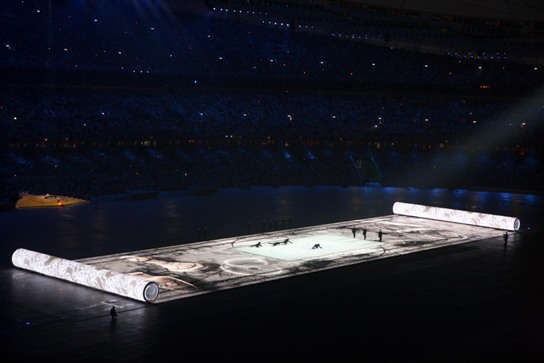By Raymond Zhou

The Beijing Olympics attracted not only elite athletes but also the very best acts of almost every genre. In its first year of full operation, the National Center for the Performing Arts, commonly known as the Eggshell, put on a rich palette of stage shows, with a total of almost 1,000 performances.
On the other end of the spectrum, small theater flourished and dozens of sharp, witty and insightful revivals and new productions were staged. And Shakespeare continued to be popular. Most singers who made their mark were from the world of classical music and it was a meager year for pop and rock, especially before the end of the big sporting events. And all the extravaganzas cannot conceal the little secret that performing arts are still a subsidized affair.
Beijing Olympics Opening Ceremony
Directed by Zhang Yimou
It was the most watched show on earth, it was the most lavish too and surprisingly, behind all the glitz and pageantry, there had great significance.
The rich tapestry of Chinese civilization was embodied in a constantly evolving and abstractly fascinating scroll painting, which was the central focus of the one-hour program that preceded the entrance of the athletes and the lighting of the torch.
Among the aspects of Chinese culture extolled, the "Four Great Inventions" of ancient China constituted one of the highlights. As 3,000 disciples of Confucius chanted: "All are brothers within the four seas", blocks, which simulated movable print type, created waves and billows, and revealed the Chinese character for harmony or peace in various stages of its evolution.
The visual effect of rising appeared throughout. To expand on the notion of harmony was a vaguely Taoist visualization of the peaceful coexistence between mankind and nature.
The theme song You and Me was delivered atop a 24-m globe, around which 58 stuntmen walked perpendicularly to the part of the Earth they happened to be, creating an illusion of weightlessness.
The performance celebrated Chinese civilization and the importance of harmony.
As a production, it was probably the biggest in Chinese history, with 15,000 people in the cast and 13 months of rehearsal time and reportedly a 4-billion-strong worldwide audience.
Runner-up: Beijing Paralympics Opening Ceremony
Though much lower in profile, the Paralympics show had its own charm. It had a more global perspective, with an emphasis on the entire universe and was more dreamy and romantic, with heart-warming moments. A mother watched her blind son playing a Four Seasons piece and a young amputee from the Sichuan earthquake realized her dream of becoming a ballerina and dancing in front of a national audience. In a sense, it aimed low but scaled high.
Palace of Eternal Youth
Produced by the Shanghai Kunqu Opera Troupe
The complete version of this rarely performed classic ran at Beijing's Poly Theater on four consecutive nights from late April through early May, making it comparable to Wagner's Ring cycle, but more of a stylistic and thematic parallel with Monteverdi's Coronation of the Poppea.
A decade ago, the same troupe was prevented from attending a full-length staging of The Peony Pavilion, a better-known Kunqu classic, at New York's Lincoln Center.
Palace of Eternal Youth tells of the love story between Tang Dynasty emperor Li Longji and his concubine Yang Yuhuan, which is immortalized in many poetic and operatic dramatizations. The current production features a talented cast with exquisite singing and stylized yet expressive performances.
The staging incorporates a dozen Venetian blind-like panels that add to the abstract look, thus enriching the original effect of Chinese opera stylization.
A few of the highlighted musicians are placed on both sides of the proscenium - a reminder of Kabuki - and the narrator at the beginning and end of each night coincides with the structure of Romeo and Juliet.
The English translation of the lyrics, by the great Yang Xianyi and Gladys Yang, captures the beauty of the Ming Dynasty script.
Runner-up: Red Cliff the Grand National Theater production
This new Peking Opera production of the familiar story, which premiered on Dec 22, has a wider appeal than the opera crowd. Directed by Zhang Jigang of the Olympics Opening Ceremony fame, it has elaborate sets, ingenious special effects and incorporates Western musical instruments. The story, from the Three Kingdoms, recalls John Woo's movie version of the same title. The last big aria sounds a note of peace amidst war and chaos, which clicks with modern sensibilities.